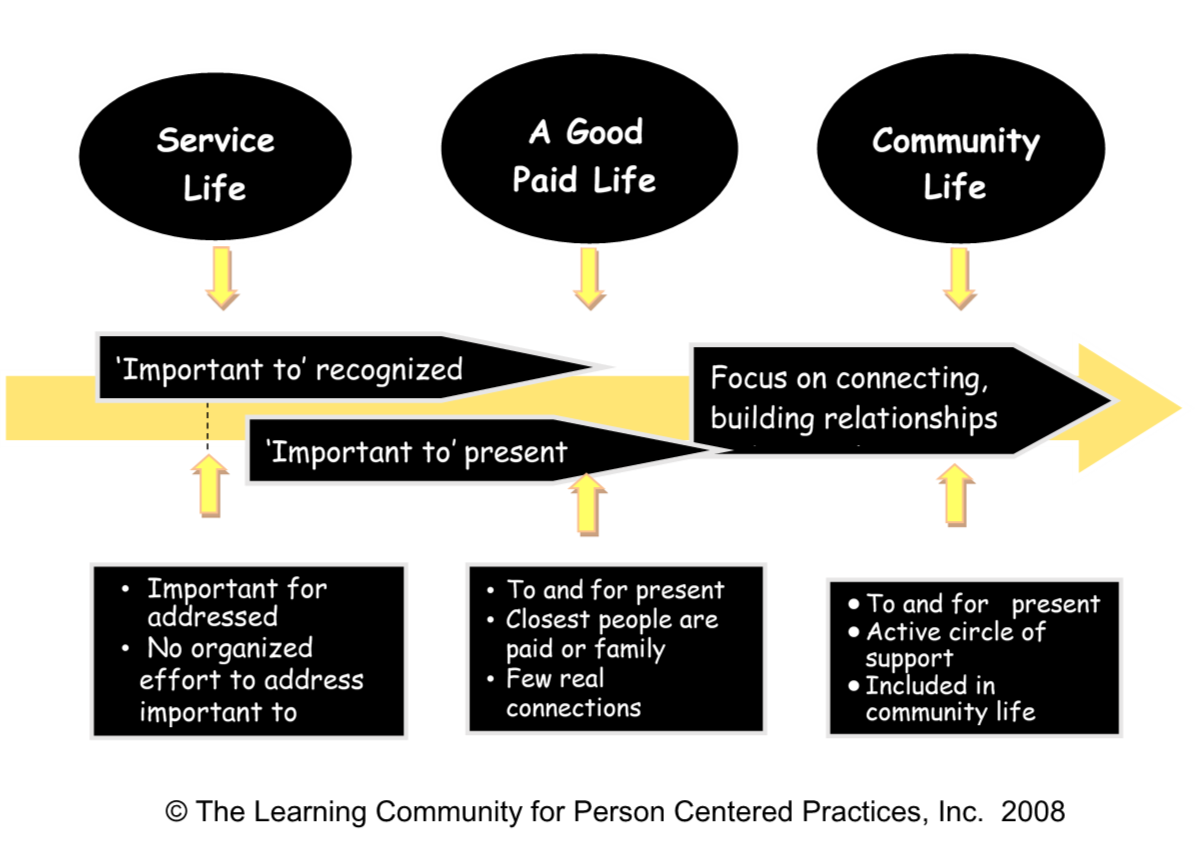Section I: The Values That Support Life in the Community
The goal of this section is to familiarize you with the vision and values to guide you in your support of people with developmental disabilities (DD) in Virginia.
The vision of Virginia is that all people with disabilities are provided the opportunities and supports needed to live a good life in their own homes and communities.
Virginia’s Principles of Person-Centered Practices
Several years ago, a group of people in Virginia developed principles to guide practice and, with a few updates, these remain our principles today.
We see a Virginia where people of all ages and abilities have the supports needed to enjoy the rights of life, liberty, and the pursuit of happiness and the opportunity to have a good life.
Having a good life means different things to different people. It includes joy and happiness, health and safety, hopes, meaningful activities, intimate relationships with family and friends, having a home, transportation, work, money (bank accounts), and opportunities to contribute to family and community.
We believe that a good life is best led by the voice of the person using supports and by following these person-centered principles.
Principle 1: Listening People are listened to and their choices are respected.
Principle 2: Community Relationships with families and friends and involvement in the community are supported.
Principle 3: Self-Direction People have informed choice and control over decisions that affect them.
Principle 4: Talents and Gifts People have opportunities to use and share their gifts and talents.
Principle 5: Responsibility There is shared responsibility for supports and choices
One significant way that Virginia is achieving this vision is through the Home and Community-Based Services (HCBS) Waivers. HCBS Waivers allow Medicaid to fund supports for people in their communities. There are six HCBS Waivers in Virginia.
Waiver services take place in a person’s home, in regular places in the community or in licensed settings or homes where staff provide Medicaidfunded supports. While all of the waivers listed at the left are under the authority of the Department of Medical Assistance Services (DMAS), the Building Independence, the Community Living, and the Family and Individual Supports Waivers are administered on a day-to-day basis by the Department of Behavioral Health and Developmental Services (DBHDS) and support people with developmental disabilities (DD).
Many of the supports and services that are available through the Waivers for people with DD are provided by direct support professionals (DSPs) who have the primary role of supporting people on a day-to-day basis with routine personal needs, social support, and physical assistance in a wide range of activities so that they can lead a self-directed life in their own community. DBHDS expects the supports provided to be person-centered and to lead to a good life for the person using Waiver services. There are characteristics of providers that are valued by Virginia’s service system. When providing supports and services, it is expected that all people providing support, including DSPs:
- Consider the wants and needs of the person first
- Realize everyone has talents
- Ask the person and those who know and love them for input
- Support a person’s self-expression, self-worth, self-reliance, and decision making
- Are flexible
- Listen to all people
- Respect all people
- Respond quickly to a person’s requests
- Pursue partnerships and teamwork
- Communicate clearly, openly, and honestly
- Think outside of the box for new ways of doing things or solving problems
- Make decisions and resolve issues
- Strive for win-win solutions
- Work to ensure that people are healthy, safe, and valued by others
- Encourage and support others to be successful
- Recognize and celebrate successes
- Develop and maintain a supportive learning environment
- Work continuously to improve services and supports
- Deliver on promises
- Follow a person’s plan as decided upon by the team
- Value and take care of oneself
REMEMBER
People with disabilities are valuable and contributing members of the community. Everyone can experience a good life in the community. People using supports should control how they live their lives. People who provide supports should focus on promoting rich and fulfilling lives in the community.
This section of the manual focuses on the values that will guide you in your support of people with disabilities. Many of the concepts are built on person-centered thinking and the work of Michael Smull and others from The Learning Community for Person Centered Practices, whose focus has been moving people with disabilities from a “service life” to a “community life.”
